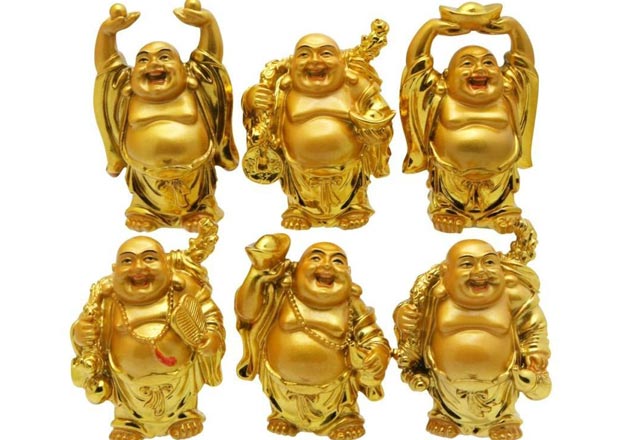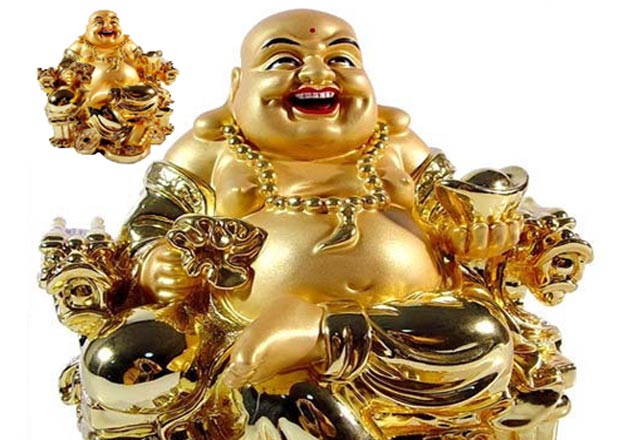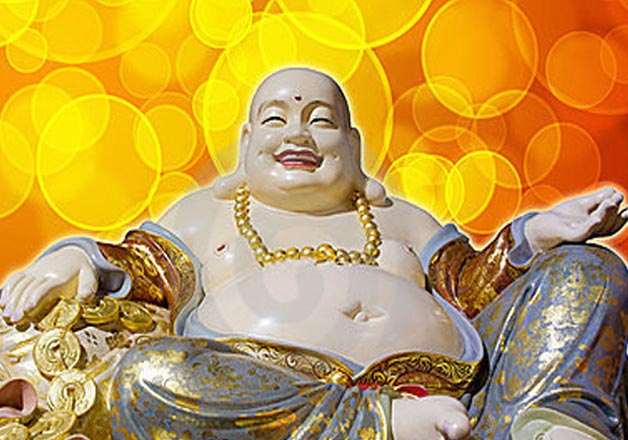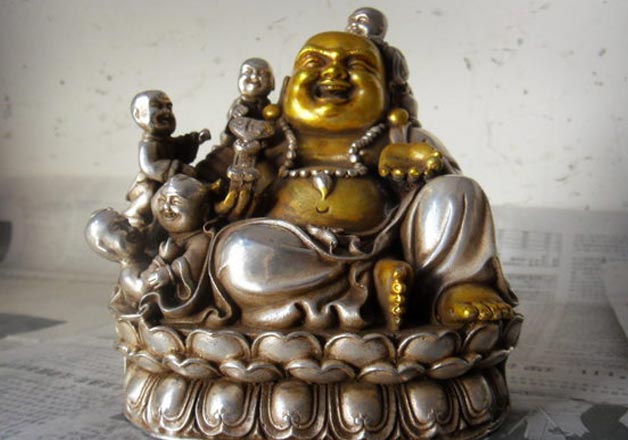Laughing Buddha, as we all know, brings good luck, contentment and abundance in one's life. It depicts plenitude of whatever one wishes for – be it wealth, happiness or satisfaction.
Usually depicted as a stout, laughing bald man with an overtly exposed pot-belly stomach, laughing Buddha or celestial Buddha is better known as Hotei or Pu-Tai.
It is said that his appearance comes from a Buddhist Zen monk who lived over 1000 years ago. His protruding stomach and jolly smile earned him this name.
Though, a symbol from Feng Shui, however, laughing Buddha holds a lot of significance in our lives. Most of us strongly believe that keeping it in a particular direction fulfils distinct desires. Hence, it is important to know that which direction should it be kept in and also which type of it should be used by individuals.
Different types of laughing Buddha

1) Laughing Buddha playing with children (usually five in number)
It symbolizes good fortune coming from heavens. It also brings good luck and positive energies.
2) Laughing Buddha with a bowl
The bowl depicts a monk's life. It is associated with renunciation of material possessions and attaining enlightenment.
3) Laughing Buddha with a fan
This one symbolizes happiness and joy. It is said that waving of fan by Buddha sculpture depicts banishment of troubles.
4) Laughing Buddha with a sack or bag
The Buddha carrying sack symbolizes a traveller. One version is that the sack means that he collects people's sadness and woes and puts them in his sack. While another version is that the sack symbolizes wealth and good fortune.
5) Laughing Buddha with beads or balls
The one with beads is considered to be a monk representing meditation practice. The beads also symbolize ‘pearls of wisdom'.
While the ball is considered to be a wealth ball and is said that it brings wealth and prosperity.
Meaning of different postures of Laughing Buddha

1) The sitting posture of Buddha is considered to be that of love and it symbolizes balance of thoughts and tranquillity.
2) The standing Buddha symbolizes riches and happiness.
3) Buddha sitting on a large gold nugget and ready to give a smaller gold nugget is a symbol of good luck.
4) Buddha with his fan hat on head represents enjoyment and good fortune.
5) Buddha holding a gold block with his hands in upright position signifies abundant riches and good luck.
6) Buddha with fan in one hand and bottle gourd in another brings blessings and good health.
7) Buddha carrying a bag of gold on his back symbolizes prosperity.
8) Buddha carrying a bag of blessings on his right shoulder and fan on the left one protects during long journeys.
Placement and direction of laughing Buddha

1) One should place a Buddha statue in his or her home to bring contentment and serenity. Buddha's birthday falls on 8th May and it is considered auspicious if a candle is lightened on his birthday. It is said that it fulfils desires.
2) Placement of Buddha in the East sector (Feng Shui Bagua Formula) or in a direction where it could be seen by all the family members when they are seated in the living room or the main hall is considered to resolve the differences amongst the family members.
3) If the Buddha statue is placed facing one's Sheng Chi direction (Feng Shui Kua Formula) then it is said to bring wealth, helpful in self-development, well-being and victory. It helps in achieving one's goals.
4) Laughing Buddha displayed in the South east direction of the main hall, dining room or bed room of the home brings windfall luck and increased income in the family.
5) Placing Buddha in office gives clear mind, reduces tensions and eliminates enemies' effect.
6) Keeping Buddha on one's desk enhances luck and fulfils aspirations.
Precautions while keeping Laughing Buddha

1) Laughing Buddha is revered in Buddhism and Feng Shui and hence it should be treated with respect. One should not place it in kitchen, bathroom or floor.
2) It should be placed at a height atleast equal to eye level.
3) It should not be placed near electrical equipments and motor parts.
4) It should not be put on TV either.
5) It should not be placed on floor also.
6) It should best be placed at a height of 30'' atleast and facing the main door.
7) If it is not possible to place the Buddha statue facing the main door, then it should be placed on a side or corner table which is facing the main door.
